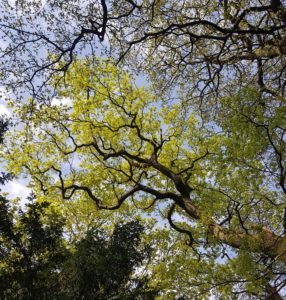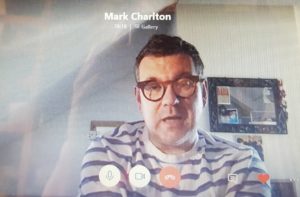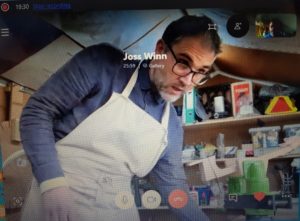In this episode Mark and I discuss the corona-crisis in relation to how we feel about the pointlessness of parliamentary politics, our views of local activism, the nature of PhD study, whether it’s okay for me to drive to go for a walk in the County, and why David Bowie will never do it for me. Even the Berlin Trilogy.
As ever, the music is by Rae Elbow and the Magic Beans.
 In this episode Mark and I discuss the corona-crisis in relation to 70’s music, our views of labour (alienating or purposeful), the number of cars on the Hinckley Road in Leicester as a measure of desire for herd immunity, and the potential for democratic planning.
In this episode Mark and I discuss the corona-crisis in relation to 70’s music, our views of labour (alienating or purposeful), the number of cars on the Hinckley Road in Leicester as a measure of desire for herd immunity, and the potential for democratic planning.
As ever, the music is by Rae Elbow and the Magic Beans.
We discuss the work of Jóhann Jóhannsson, and especially the wonderful “The Cause Of Labour Is The Hope Of The World” from The miners’ Hymns.
I mention Rozworski and Phillips’ “The People’s Republic of Walmart: How the World’s Biggest Corporations are Laying the Foundation for Socialism“, and Ciccariello-Maher’s “Building the Commune: Radical Democracy in Venezuela“.
This is also a must-read or watch on the black experience of Covid-19, from Ruha Benjamin: Black Skin, White Masks: Racism, Vulnerability & Refuting Black Pathology.

Following on from Episode 15, in which Mark Charlton and I discussed the genesis of The Coronavirus Diaries, we return to discuss the project and diary entries we have received so far. On the way, we discuss my current obsession with the 1980s and 1990s, the music of The The, whether Mark has been dreaming, and applauding key workers whilst looking our for the international space station.
For the first 5 minutes we sound a bit curmudgeonly. But then we are both old, middle-aged and entitled white men.
As ever, the music is by Rae Elbow and the Magic Beans.
Soul Mining by The The is amazing.
The No Nobhead Policy blog is here.

I talk to my good friend Joss Winn about spirituality, Buddhism and Quakerism, the making and playing and crafting of guitars, research into Luthiers, and the impact of the pandemic on work and home. Joss and I have been friends for a decade, writing on critical theory and higher education, and attempting to walk-the-walk on alternative practices. In this podcast, we discuss the common strands or threads that accompany personal transformation, the importance of making, the possibility for autonomy in work, and how one might know oneself and recover oneself after a breakdown.
It seems apposite to interview Joss at this time, as he and his wife Sue came to my Mum’s funeral almost seven years ago. In fact, the anniversary of her death is in two days. I will be forever grateful that they were there.
You can read more about Joss’s work at: https://josswinn.org/
His lovely, edited collection of his late father’s work is at: https://josswinn.org/2016/06/22/what-we-leave-behind/
With Mark Charlton from down our street, I discuss our citizen science project-cum-group therapy session-cum-local diary of life, that is our Street Diary under the dominion of Covid-19. We discuss how we are living under the virus as it infects our bodies and our lives, the role of the market and the idea of the common good, and whether everything really will come up roses. I mention watching the 1973 FA Cup Final, and we both highlight how busy and exhausted we are.
Street diary, known as The Coronavirus Diaries, can be found at: https://streetdiary.org/
Mark is: https://twitter.com/thenewstatsman
I am currently listening to new work by Four Tet, Caribou, Little Dragon and Yves Tumor. I commend them to you.
Keep safe, and persevere. Always.
This is a podcast at the intersection of: first, what it means to be a professor; and second, what it means to be on strike. I am one of two professors on our UCU committee, and I do casework for members. Being on strike involves supporting more precarious colleagues, staff who are struggling over inequalities or casualised employment, staff whose pay has been devalued over a decade, staff who are struggling with excessive and intensive workloads. It involves trying to tie these struggles in to student campaigns, the work of our professional services’ staff in creating a meaningful learning environment, our work on decolonisation and gender equality. Beyond this, it involves linking to struggles in society for the common good.
However, it feels important for professors to show leadership in our #fourfights and #ucustrikesback campaigns. It feels important for them to challenge their own privilege, status, resources, and to place these at the service of those with less. So, I invited some questions and comments about professors on strike and professors not on strike, and I seek to address them here. There is also something of a preamble from me, which as usual goes on and on and on.
As ever, the music is provided by Rae Elbow and the Magic Beans, with the closing track being indoctrined sedation.
Anyway, in solidarity, and keep warm and safe on the picket line.
I’m ready to write. I’ve sorted my notes. I feel the urge, need, desire to write again. And to write something substantial, with the University as the unit of analysis and with a dialectical, humanist, relational framing.
I’ve detailed what this next project is about, namely a monograph entitled The Hopeless University: Intellectual Work at the End of the End of History.
Images of the structure are available at: Chapter 1; Chapter 2; Chapter 3; Chapter 4; Chapter 5; Chapter 6; and Chapter 7. As a kick-start, I discuss the key themes here.
In solidarity.
I decided to dedicate a blogpost to my mate Jon Beech. If you want to make a donation or get involved with the Leeds Asylum Seekers Support Network, you can do so here. The blogpost is not recorded in a café when I’ve forgotten my directional mics, and so the sound quality is better.
I discuss or make mention of 11 things that have catalysed important reflections for me in 2019. These are as follows.
Reading/thinking
Doing
- My doubt over the value and meaning of my voluntary work, and its relation to organising around paid work.
- My energy in relation to organising around paid work.
Being
- The collapse of my love for football, and any meaning to be taken from it beyond friendships.
- Caring for my Nan, and being myself in a particular place.
- Internalising the ways in which Sunita Puri considers palliative care, and who is centred in any interaction we have in this world.
- Mourning and celebrating the end of therapy.
In peace.
I met my friend and fellow Walsall supporter, Paul Trivett, in The Bell, Walsall, ahead of the home game with Macclesfield on Saturday 14 December. We discussed the differences between faith and hope, the relationship between hope and football as opposed to hope and University life, the ways in which institutions peddle hope, and the almost-impossibility of building coherent lines of resistance and struggle from where we are. Because, frankly, building such lines just isn’t what people want, or work they wish to undertake. Instead, we fixate upon the limited horizons of what we can imagine will help us to survive in the world.
And I just thought we were going to discuss away games we had loved, our favourite football podcasts, and the inability of football managers to find systems of play that matched the players they had at hand.
As usual, the music is provided by Rae Elbow and the Magic Beans.
I met my friend Sarah Amsler from the School of Education at the University of Nottingham last Friday for a catch-up. We discussed issues of how hope is coded, which made me think about how it is eroded, Vanessa Andreotti’s metaphors of the hospice and the beach in relation to institutions and structures, Alexis Shotwell’s ideas of purity and entanglement in our everyday experiences, and the gloopy nature of brownies.
Our discussion took place in the Ugly Bread Bakery in Nottingham, and so there is a lot of background noise. This has made me tetchy, because I forgot my directional microphones. So, I apologise that you will have to turn up the sound and work hard to catch what Sarah has to say. I have uploaded the file anyway because if you ignore my constant interruptions and jibber-jabber (note to self: #stfu), you will hear how insightful she is.
The extra resources Sarah mentions are as follows.
Vanessa Andreotti: How can we hospice a dying way of knowing/being and assist with the birth of something new, still fragile, undefined and potentially (but not necessarily) wiser with radical tenderness? See also: Toward Alternative Futures in Uncertain Times.
Amsler, S. (2016). Learning hope: an epistemology of possibility for advanced capitalist society. In: Social sciences for an other politics: women theorizing without parachutes. Palgrave Macmillan.
Santos, B. (2014). Epistemologies of the South: Justice against Epistemicide. London: Routledge.
Shotwell, A. (2016). Against Purity: Living Ethically in Compromised Times. Minnesota, MN: University of Minnesota Press.



